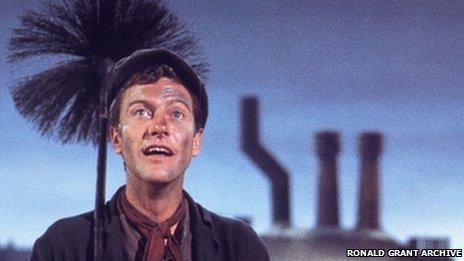The return of the chimney sweep
- Published

Associated with a bygone age of child labour and smoke-filled skies, chimney sweeps are reporting a mini-revival. Why?
They might be considered lucky, they might - thanks to a certain 1964 Walt Disney movie, external - be portrayed as nifty dancers, but there is little about the popular conception of chimney sweeps that evokes modern Britain.
Mention the trade, and the associations conjured up are of a distant, Victorian, pre-radiator era: grim, soot-filled skies; small urchins compelled to spend long days toiling up chimneys; Dick Van Dyke's abysmal cockney accent.
Yet as autumn dawns and householders across the country prepare to have their flues swept, one unintended consequence of the credit crunch has been a resurgence in demand for the service.
The 1956 Clean Air Act, which enforced the use of smokeless fuels in many areas, may have been good for the environment and the quality of life of millions, but it proved devastating to a centuries-old occupation often passed down from father to son.
However, according to the National Association of Chimney Sweeps (Nacs), recent years have seen their members having to juggle extra demand and an "influx" of new trainees.
Thanks to soaring gas prices, sales of wood-burning and multi-fuel stoves rose 40% in 2008 as homeowners attempted to cut their bills.
This, in turn, has meant more chimneys needing to be regularly cleaned and more business for the small, self-employed army of sweeps across the country.
All of this is a welcome surprise for Martin Glynn, who as president of Nacs represents its 250 members.
On the one hand, Mr Glynn, 54, who runs BG Wright Master Sweep Services in Orpington, Kent, talks wistfully of the trade's traditions and customs: he is, he annunciates with audible pride, a third-generation sweep.
Yet he also talks sombrely of the Nacs's strict accreditation scheme, the NVQ in chimney engineering typically undertaken by its members, the £4,000 worth of CCTV equipment used by modern sweeps such as himself.
"These days, we aren't the men with a stick and a brush that you saw in Mary Poppins," he says.
"It's not easy - it's hard, physical work, which is why so many sweeps are ex-services. You have to be careful because the soot is carcinogenic.
"But, I tell you, you never need to go to the gym, and when you're up there on the roof among all the chimney pots there's nothing like it.
"I don't mind getting dirty. Now I can identify all the different types of soot - coal soot, wood soot, oil soot. It's a fascinating job."
Mr Glynn says his peak season runs from September to March, although in the relatively quiet summer months he supplements his income by appearing at weddings.
In doing so, he capitalises on a superstition that sweeps are good luck, dating back to King George III's life supposedly having been saved by one. As a result, he says, "we welcome anyone as a sweep, from any background - the only people we discriminate against are anti-monarchists".
Indeed, the seasonal nature of the job - not to mention its usually self-employed status - is, for some sweeps, a lure in itself.

Gina Somerton became a chimney sweep so she could spend more time with her children
Growing up, Gina Somerton, 42, of Wells-Next-the-Sea, Norfolk, had dreamed of becoming a hairdresser and went on to work as a shop assistant and in restaurants.
But a conversation about possible alternative careers with her partner's mother got the mum-of-three thinking that chimneys might be an ideal source of income; six years on, her business, Lady Sweep, is thriving.
"I wanted to be my own boss, I wanted to be able to spend time with my children during the summer," she says. "It might sound strange to some people, but to me it's perfect.
"It's true that I get dirty. But I can come home and have a shower afterwards, can't I?"
Nonetheless, even the oldest hands have a limited tolerance of soot and grime.
Lashman Singh, 60, has been a sweep for 30 years in Bradford, West Yorkshire, and is old enough to remember the days before the Clean Air Act. Although the trade has been good to him, he has no desire to return to its heyday.
"As a child, growing up, everything in Bradford was dark, dismal and black," he says. "We wouldn't want to go back to that.
"To me it's a job, a way of making a living. What I like is the variety of people you meet. Everyone has different ornaments and decorations on their mantelpiece."
For now, anyway, the living can be a good one; for this, Britain's sweeps are counting themselves lucky. As lucky can be.